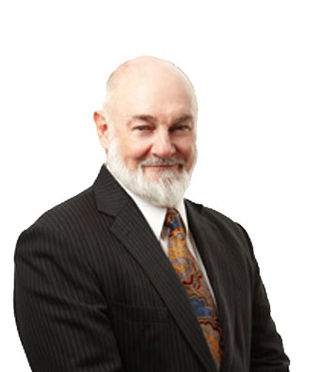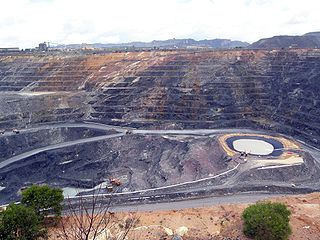Related Research Articles

Kakadu National Park is a protected area in the Northern Territory of Australia, 171 km (106 mi) southeast of Darwin. It is a World Heritage Site. Kakadu is also gazetted as a locality, covering the same area as the national park, with 313 people recorded living there in the 2016 Australian census.

Jabiluka is a pair of uranium deposits and mine development in the Northern Territory of Australia that was to have been built on land belonging to the Mirarr clan of Aboriginal people. The mine site is surrounded by, but not part of, the World Heritage–listed Kakadu National Park.

The Ranger Uranium Mine was a uranium mine in the Northern Territory of Australia. The site is surrounded by, but separate from Kakadu National Park, 230 km east of Darwin. The orebody was discovered in late 1969, and the mine commenced operation in 1980, reaching full production of uranium oxide in 1981 and ceased stockpile processing on 8 January 2021. Mining activities had ceased in 2012. It is owned and operated by Energy Resources of Australia (ERA), a public company 86.33% owned by Rio Tinto Group, the remainder held by the public. Uranium mined at Ranger was sold for use in nuclear power stations in Japan, South Korea, China, UK, France, Germany, Spain, Sweden and the United States.

The Australian Conservation Foundation (ACF) is Australia's national environmental organisation, launched in 1965 in response to a proposal by the World Wide Fund for Nature for a more co-ordinated approach to sustainability.

Rum Jungle is a locality in the Northern Territory of Australia located about 105 kilometres south of Darwin on the East Branch of the Finniss River. It is the site of a uranium deposit, found in 1949, which has been mined.

Energy Resources of Australia Ltd is a public company based in Australia. It is a subsidiary of the Rio Tinto Group which as of 2021 owns 86.3% of the company. The remainder is publicly held and traded on the Australian Securities Exchange. The chairman is Peter McMahon and Chief Executive is Andrea Sutton.

Kakadu National Park, located in the Northern Territory of Australia, possesses within its boundaries a number of large uranium deposits. The uranium is legally owned by the Australian Government, and is sold internationally, having a large effect on the Australian economy. The mining has been controversial, due to the widespread publicity regarding the potential danger of nuclear power and uranium mining, as well as because of objections by some Indigenous groups. This controversy is significant because it involves a number of important political issues in Australia: Native Title, the environment, and Federal-State-Territory relations.

Kevin Buzzacott, often referred to as Uncle Kev, was an Aboriginal Australian rights campaigner and elder of the Arabunna nation in northern South Australia. He campaigned widely for cultural recognition, justice, and land rights for Aboriginal people. He initiated and led numerous campaigns, including against uranium mining at Olympic Dam mine on Kokatha land and the exploitation of the water from the Great Artesian Basin. He also published a collections of poetry, which included the content of his keynote address at a 1998 conference.

Nuclear weapons testing, uranium mining and export, and nuclear power have often been the subject of public debate in Australia, and the anti-nuclear movement in Australia has a long history. Its origins date back to the 1972–1973 debate over French nuclear testing in the Pacific and the 1976–1977 debate about uranium mining in Australia.
Yvonne Margarula is an Aboriginal Australian environmentalist who won the 1998 Friends of the Earth International Environment Award and the 1998 Nuclear-Free Future Award. She also won the 1999 US Goldman Environmental Prize, with Jacqui Katona, in recognition of efforts to protect their country and culture against uranium mining.

Robin Howard Chapple is an Australian politician.

Beginning as a conservation movement, the environmental movement in Australia was the first in the world to become a political movement. Australia is home to United Tasmania Group, the world's first green party.

Radioactive ores were first extracted in South Australia at Radium Hill in 1906 and Mount Painter in 1911. 2,000 tons of ore were treated to recover radium for medical use. Several hundred kilograms of uranium were also produced for use in ceramic glazes.

The uranium mining debate covers the political and environmental controversies of uranium mining for use in either nuclear power or nuclear weapons.
Jacqui is a given name, usually a diminutive form of Jacqueline or Jacquelyn. Notable people with the name include:
The Yeelirrie uranium project is a uranium deposit located approximately 70 km southwest of Wiluna, in the Mid West region of Western Australia. The name Yeelirrie is taken from the local sheep station.
Yeelirrie is an East Murchison pastoral lease or sheep station on state Crown land, located approximately 80 kilometres (50 mi) south west of Wiluna, in the Mid West region of Western Australia. The nearest population centre to Yeelirrie homestead is Mount Keith Mine village, 45 kilometres (28 mi) to the east. The regional centre is Meekatharra, located 180 kilometres (112 mi) to the west.

The Olympic Dam mine is a large poly-metallic underground mine located in South Australia, 550 km (340 mi) NNW of Adelaide. It is the fourth largest copper deposit and the largest known single deposit of uranium in the world. Copper is the largest contributor to total revenue, accounting for approximately 70% of the mine's revenue, with the remaining 25% from uranium, and around 5% from silver and gold. BHP has owned and operated the mine since 2005. The mine was previously owned by Western Mining Corporation. Since the 1970s environmentalists, traditional owners and others have campaigned against the mine, largely on the basis of its contribution to the nuclear cycle and its use of underground water.
Ranger Uranium Environmental Inquiry (RUEI) (also known as the Fox Report) was a committee established by the Whitlam government in Australia, which sought to explore the environmental concerns surrounding uranium mining. The Inquiry was established in 1975.
